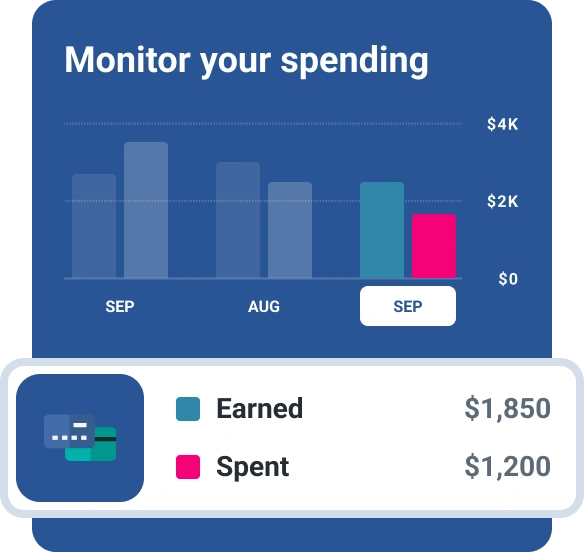How Much Income Do I Need for a Student Credit Card?
Quick Answer
Most student credit card issuers don’t list a minimum income requirement, but they will consider a variety of income sources. If you’re under age 21, your income must be consistent and received independently.

If you're a student applying for a credit card, you'll have to provide your income so the card issuer can determine what you can afford to pay. Your income affects both your approval odds and the credit limit you qualify for.
Most student credit card issuers don't list a minimum income requirement, but they do want to see that you have enough consistent income to make payments on time. Understanding what you can and can't include as income can improve your chances of getting approved for a student credit card.
How Much Income Do I Need for a Student Credit Card?
There isn't a set dollar amount required to qualify for a student credit card. What matters is having enough steady income to cover your minimum payments and other financial obligations.
Card issuers use the income you report to determine whether you can afford the minimum payments on the credit limit they're willing to offer you. Generally, the higher your income, the higher your potential credit limit.
Learn more: How Is a Student Credit Card Different From a Regular Credit Card?
What Counts as Income on a Credit Card Application?
If you're under 21, you can only include income that you personally receive on your credit card application. Fortunately, there are several forms of acceptable income that can help you qualify for a student credit card.
Employment Income
Earnings or bonuses from full-time or part-time work, work-study jobs, internships or tips all can be included as income. Even if your job is seasonal or part time, it still counts as long as you receive the income directly.
Freelance or Self-Employment Income
Money from tutoring, delivery driving, content creation or other freelance or gig work may count as income if it's consistent and paid directly to you. Make sure you can show a reliable history of earnings and deposits to support the income you put on your credit card application.
Allowance or Family Support
You can include money from parents or relatives, like allowance or gifts, if it's regularly deposited into an account you own individually or share jointly. If this money arrives on a set schedule it can be considered reasonably expected income under credit card income requirements.
Financial Aid Refunds
If your student loan, scholarship or grant funds exceed the cost of your tuition and fees, the leftover amount may be included as income. The refunded amount is typically deposited into your bank account and can be used for living expenses.
Trust Fund or Investment Income
Regular distributions from a trust, dividends or interest payments may count as income if you receive them directly. You can report investment earnings that you receive monthly or quarterly as long as the funds are predictable and they're deposited into an account you own.
Public Assistance, Alimony or Child Support
Financial support you receive from government programs, alimony or child support can qualify if you're the one receiving the payments. You're not required to include this income, but you can if it helps your eligibility.
Household or Cosigner Income
If you're 21 or older, you can include your own income plus income earned by a partner or spouse if it's reasonably available to you. You can include a cosigner's income if you're applying for a credit card jointly. Their income can help you qualify for a higher credit limit or better terms.
Tip: Keep documentation, like pay stubs and bank statements, to verify your income and show consistency if asked.
What Doesn't Count as Income on a Credit Card Application?
It's important to avoid overestimating your income when you're filling out a credit card application. Certain funds and income sources don't count because they're not regular, are unverifiable or are not directly under your control.
- Parent or household income: If you're under age 21, you can't list your parents' or household income unless it's regularly deposited into your account.
- Credit or borrowed money: Loans, cash advances or money borrowed from friends or family doesn't count because you're expected to repay them. Some credit card issuers may not allow you to include student loans.
- One-time or unpredictable income: Gifts, occasional side gigs or one-off transfers that can't be verified or reasonably expected monthly don't count.
- Financial aid for tuition or fees: Scholarships or student loans applied directly to your school balance can't be counted. You can only include leftover funds you receive.
- Indirect support: Money used for shared expenses or benefits paid on your behalf don't qualify as income. For example, you can't include money your roommate gives you for their portion of the rent or child support payments sent to your parent.
Learn more: Can You Get a Credit Card Without a Job?
What Other Factors Matter for a Credit Card Application?
Income is just one factor considered in a credit card application. Here are some other factors card issuers use to evaluate your application.
- Age: You must be at least 18 to apply for a credit card. Qualifying is often easier after 21 when income rules are more flexible.
- Identity verification: Card issuers use your date of birth, Social Security number and current street address to verify your identity and prevent fraud.
- Residency: You'll typically need to be a U.S. citizen or permanent resident to qualify for most student credit cards.
- Credit score: Many credit card issuers check your credit, but if you don't have a credit score yet, some issuers may consider other factors.
- Debt payments: Existing loan payments can affect approval since they lower your available funds to pay off new debt.
- Enrollment status: Most student cards require that you're enrolled at least part time in a college or university.
Alternatives to Opening a Student Credit Card
If you don't have income or you want to start more gradually, there are other ways you can build credit or gain spending flexibility.
- Get a debit card. You can open a checking account with a debit card for making everyday purchases online and in person.
- Become an authorized user. A parent or family member can add you to their existing credit card account. As an authorized user, you can build credit without applying for a credit card on your own.
- Apply with a cosigner. Your chances of approval are better with a cosigner because that person agrees to take responsibility for the credit card balance if you can't make payments.
- Open a secured credit card. After applying for a secured card, you provide a refundable security deposit, usually $200 or more, which becomes your credit limit. With consistent payments, you can often upgrade to an unsecured card.
- Use buy now, pay later (BNPL) plans responsibly. Short-term payment plans can offer flexibility without a credit check, but BNPL plans may not help you build credit.
Learn more: How to Get a Credit Card if You Don't Have Credit History
The Bottom Line
Student credit card issuers don't publish a specific income threshold. Instead, they focus on whether your income is consistent and high enough to manage your monthly payments. You can include income from multiple sources, as long as it's yours and reasonably expected to continue.
Shopping around is the best way to find the best student credit card for you. As you compare credit cards, pay attention to the fees, interest rate and other features. Whether you choose a student credit card or an alternate option, responsible use is key for protecting your finances and qualifying for better credit offers in the future.
Credit cards for students
Looking to build your credit? Browse credit cards and secured credit cards designed for students. Get started with your FICO® Score. for free
See your offersAbout the author
LaToya Irby is a personal finance writer who works with consumer media outlets to help people navigate their money and credit. She’s been published and quoted extensively in USA Today, U.S. News and World Report, myFICO, Investopedia, The Balance and more.
Read more from LaToya

